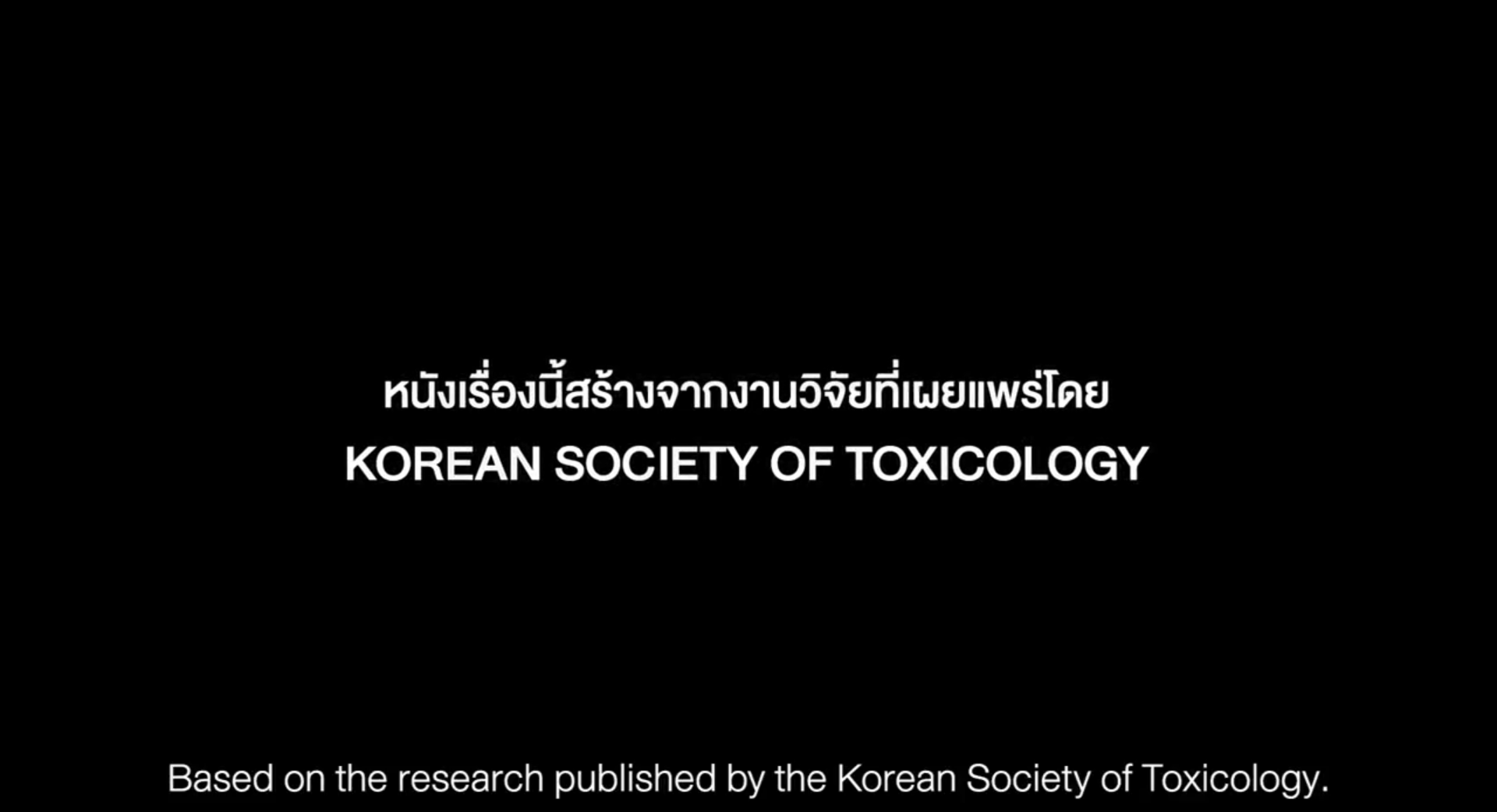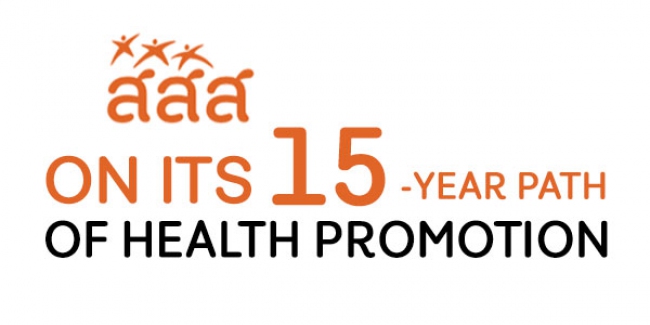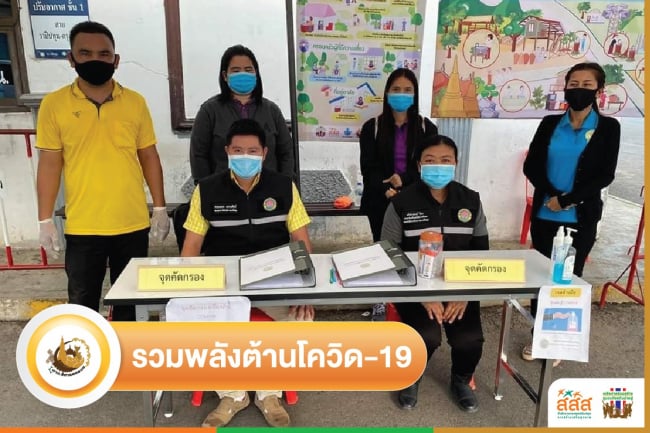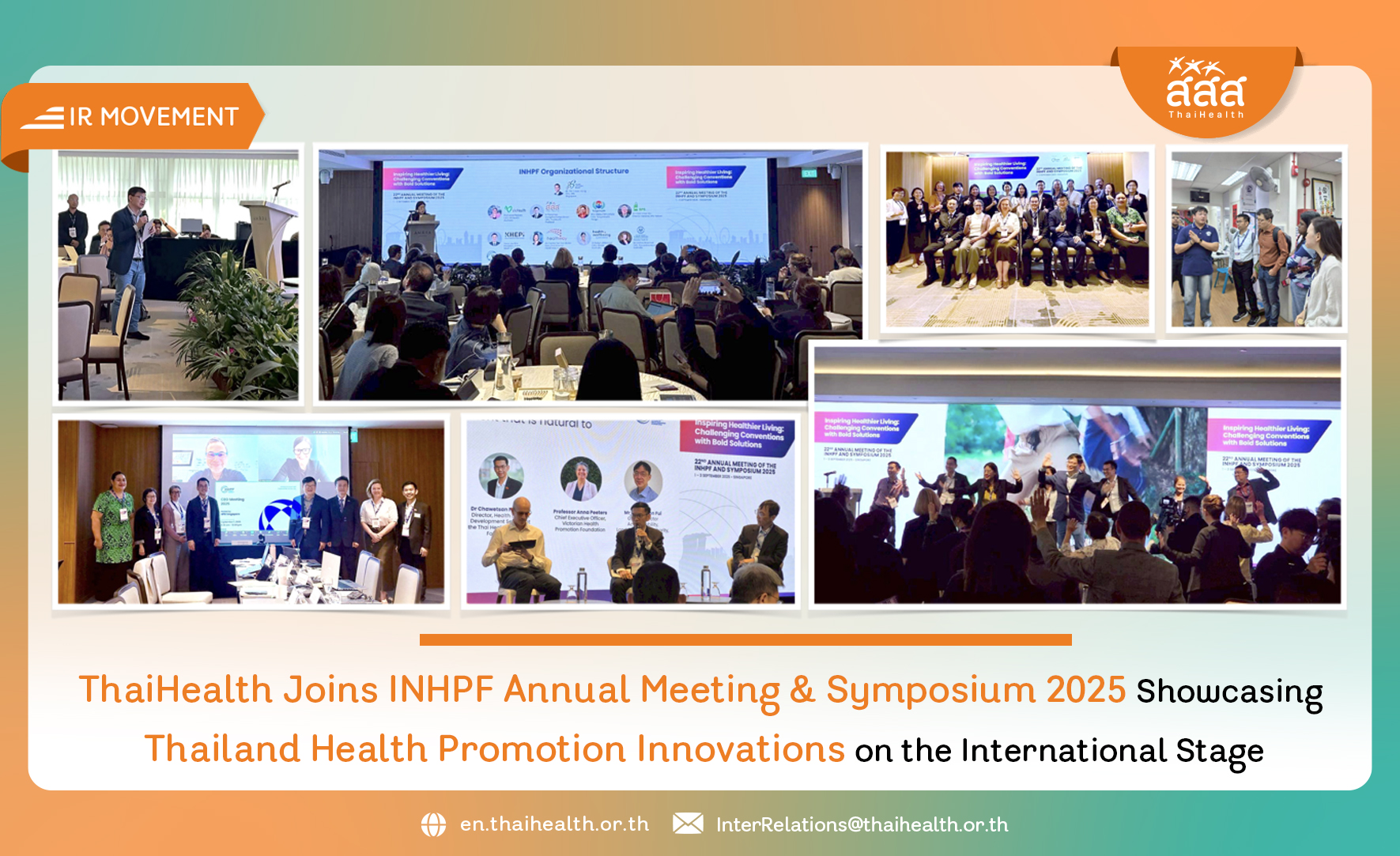
ThaiHealth Joins INHPF Annual Meeting & Symposium 2025 Showcasing Thailand Health Promotion Innovations on the International Stage
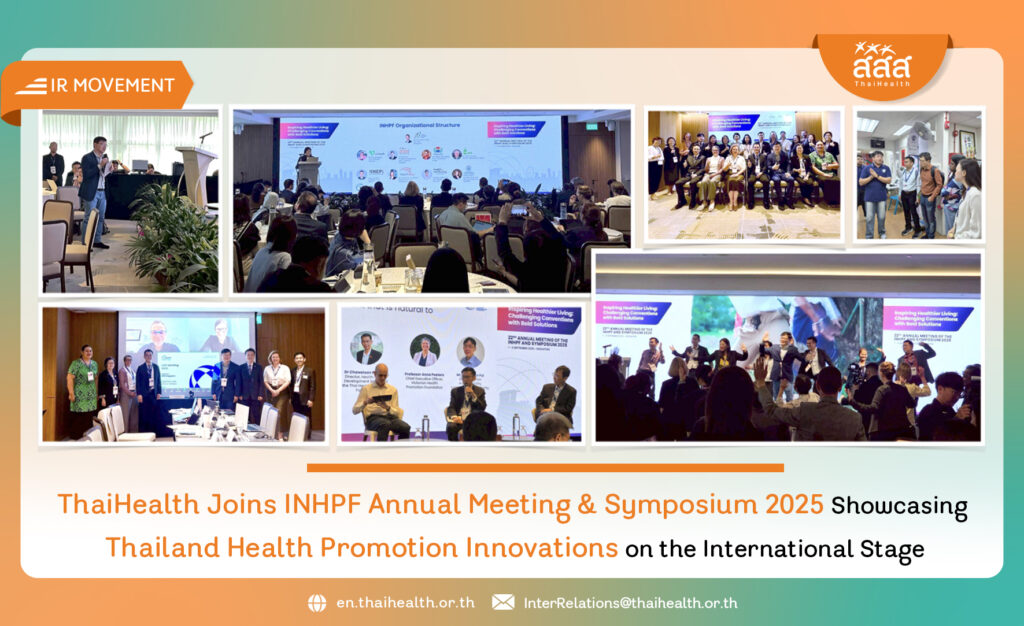
From September 1–3, 2025, at the Amara Hotel, Singapore, the Thai Health Promotion Foundation (ThaiHealth), in its role as Secretariat and member of the International Network of Health Promotion Foundations (INHPF), participated in the “INHPF Annual Meeting & Symposium 2025,” organized by the Health Promotion Board (HPB) Singapore under the theme “Inspiring Healthier Living: Challenging Conventions with Bold Solutions.”
In addition to the 9 full members of the INHPF, The meeting convened health promotion leaders from the Asia-Pacific, Africa, and global partners, including the World Health Organization – Western Pacific Regional Office (WHO-WPRO), Southeast Asia Tobacco Control Alliance (SEATCA), PROGGA from Bangladesh, Health Promotion Centre Brunei Darussalam, Ministry of Health Vanuatu, Ministry of Health Kenya, International Institute for Legislative Affairs (Kenya), and McCabe Centre for Law and Cancer (Australia).
The INHPF Network also officially welcomed new associate members: the Ministry of Health Malaysia, PROGGA (Bangladesh), Health Promotion Centre Brunei, McCabe Centre for Law and Cancer (Australia), and the Sarawak State Health Department (Malaysia). This expansion reflects INHPF’s growing role as a key platform connecting international practices and policies in health promotion.
Platform for Knowledge Exchange and Cooperation
The INHPF Annual Meeting & Symposium 2025 served as a platform bringing together global health promotion leaders to exchange knowledge, foster cooperation, and set future directions, while strengthening ties among member organiztions. Key topics of discussion included e-cigarettes, social marketing, mental health, and environments conducive to well-being.
The event provided ThaiHealth the opportunity to showcase its work internationally, learn from other member countries, and develop new collaborations with global organizations.
ThaiHealth’s Contributions to INHPF
Under the leadership of Dr. Pongthep Wongwatcharapaiboon, ThaiHealth CEO and INHPF Secretary-General, the Foundation plays a pivotal role in driving the Network’s mission: strengthening member countries’ capacity in health promotion through knowledge and expertise, and reinforcing INHPF’s organizational resilience.
In the past year, the Network has advanced knowledge dissemination by producing and sharing articles and infographics on critical health promotion issues. It has also pushed important policy initiatives, such as the joint statement for World No Tobacco Day on May 30, 2025, and the upcoming joint statement on Non-Communicable Diseases (NCDs) scheduled for release on September 18, 2025. These actions align INHPF’s agenda with global health priorities.
In addition, INHPF organized executive-level meetings and international exchanges, reflecting the Secretariat’s strong coordination and inclusive engagement across sectors.
Expanding the Network
The past year also saw the addition of five new members: the Ministry of Health Malaysia, PROGGA (Bangladesh), Health Promotion Centre Brunei, McCabe Centre for Law and Cancer (Australia), and Sarawak State Health Department (Malaysia). Their involvement further strengthens the Network’s power and capacity for regional and global collaboration.
Advancing ThaiHealth’s Global Role
INHPF’s work aligns with ThaiHealth’s international strategy, connecting Thailand’s experiences to the global stage and positioning the country as a leader in health promotion. This includes sharing tangible policy models such as health tax mechanisms to finance health funds, tobacco and alcohol control policies, and behavior-change campaigns—all of which have been adapted by several countries to fit their contexts.
ThaiHealth’s Innovations Showcased
At the symposium, Dr. Chawetsan Namwat, Director of the Health System Development Section, presented ThaiHealth’s innovative initiatives highlighting systemic health promotion efforts:
- Good Walk Score – Thailand’s first urban walkability index, integrating GIS data and public feedback to assess access to amenities, safety, and walkability. The index encourages walking, reduces pollution, supports local economies, and informs urban planning with community participation.
- ThaiHealth Resource Center – A digital platform consolidating health promotion knowledge and tools for schools, workplaces, and communities. This helps strengthen digital health literacy through learning modules and knowledge exchange spaces. It supports curriculum integration, accident prevention, and quality of working life improvements.
- Co-Investment Model – A co-funding mechanism with local governments providing both funding and expertise to design community health projects. This approach has fostered meaningful participation, efficient resource use, and resulted in over 6,580 community health leaders and 697 projects improving sustainable health behaviors
Key Issues Highlighted
Sessions emphasized the urgency of addressing NCDs, emerging threats from e-cigarettes, the influence of environment and infrastructure on health, community empowerment, digital innovations for mental health, and multi-sectoral collaboration driven by leadership at all levels.
- In the Plenary Session, Dr. Suwit Wibulpolprasert, Vice President of the International Health Policy Program Foundation (IHPP Foundation), noted the world is falling behind on NCD reduction targets despite repeated commitments. He emphasized that strong implementation of health taxes—raising tobacco, alcohol, and sugar prices—remains one of the most effective measures.
- Singapore presented the National Steps Challenge, with over 1 million participants, successfully reducing obesity prevalence and reversing diabetes trends, particularly among men.
- Taiwan showcased its Holistic Abdominal Obesity Management Program, addressing a 27.8% prevalence rate, engaging 400,000 participants, with 90% reporting improved health outcomes. Its success stemmed from cross-ministerial cooperation, multi-sectoral integration, age-specific programming, and digital health infrastructure—though challenges remain around digital equity and privacy.
Addressing E-Cigarettes and Mental Health
The Breakfast Roundtable spotlighted e-cigarettes as a serious emerging public health threat, particularly targeting youth. 2024 data revealed 16.8% of youth had ever used e-cigarettes, and 4.8% were current users. Beyond nicotine, harmful substances like etomidate—detected in Singapore—pose risks of severe psychiatric symptoms, arrhythmia, and adrenal failure. The session underscored urgent legal and enforcement gaps amid rapidly evolving markets, calling for comprehensive responses: strong regulation, awareness campaigns, cessation support, evidence-based research, and international cooperation. Singapore’s strict ban on e-cigarettes since 2018 was noted as a leading model.
The meeting also emphasized youth mental health, highlighting ThaiHealth’s digital platforms linked to the Toll-Free 1323 mental health hotline, 24-hour phone counseling, and youth-focused platforms. Singapore’s campaign “It’s Okay to Reach Out” was cited as an effective example in encouraging help-seeking behavior.
Conclusion
At the INHPF Annual Meeting & Symposium 2025, ThaiHealth demonstrated Thailand’s leadership and driving force in health promotion. Through digital innovation, collaborative initiatives, and community empowerment, ThaiHealth showcased practical models that integrate health into everyday life, paving the way for sustainable well-being for all Thais.





